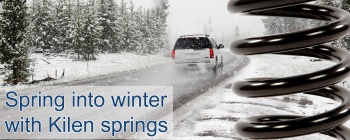
Winter months see an increase in coil and gas spring replacements
Kilen explains why the cold weather is not entirely to blame…
Automotive suspension springs go through a lot - coil springs are a central component of a vehicle’s suspension system, constantly working to absorb shocks and deal with uneven road surfaces, while gas springs support the opening and closing of a vehicle's boot or bonnet.
Cold temperatures have an adverse effect on both coil and gas springs, leading to increased demand during winter months. However, it is not just the cold weather that can reduce the lifespan of a spring – summertime activities such as caravanning and fitting a cycle rack can also play their part.
COIL SPRINGS
Each year, thousands of holidaymakers hook up their caravan or trailer and take to the open road in search of good times and a relaxing break. Unfortunately, many drivers do not take into consideration the effect that towing a heavy caravan may have on their suspension springs – typically signified by the rear of the vehicle sitting markedly lower than the front.
This is because the rear springs have been loaded to levels beyond that for which they were designed, and are therefore unable to return the vehicle to its correct ride height. As a result of this ‘sitting down’ effect, vehicle handling will be compromised and the extra stress on the rear springs may result in sag (long term shortening) and increase the chance of premature breakage.
To compensate for the additional load and to reduce the ‘sitting down’ effect, Kilen supply a comprehensive range of heavy-duty coil springs that are 15 to 30% stronger than standard springs (vehicle dependant). These stiffer springs are able to support a heavier load without compromising vehicle handling.
Kilen heavy duty springs work with standard shock absorbers, meaning no further suspension upgrades are required, and most heavy duty springs are designed to be shorter than standard springs to ensure the car does not sit too high when unloaded.
Given their different characteristics to standard springs, it is vital that heavy duty coil springs are always fitted in axle pairs to avoid potentially severe safety risks, including less responsive steering, less secure road holding and increased braking distance.
GAS SPRINGS
Automotive gas springs aide the elevation of a vehicle’s boot or bonnet - they hold the weight once open and allow for a controlled close. In order to ensure smooth, controlled operation, each spring is designed to hold up half the total weight of the tailgate or bonnet – any additional weight will affect the performance and shorten the life expectancy of the springs.
Therefore, a rear-mounted bike rack should always be removed before the boot is opened. Opening the boot with the rack still attached subjects the springs to more weight than they were designed for and will make premature failure more likely. Additionally, the extra weight when closing the hatchback places undue force into the gas springs, making damage to the seals more likely. If a bike rack has been used over the summer, the vehicle’s gas springs should be checked and if necessary replaced before winter to ensure effective performance.
Kilen HD coil springs and gas springs are available from FPS. Speak to your local FPS representative for further information


 Click here to open the navigation menu
Click here to open the navigation menu